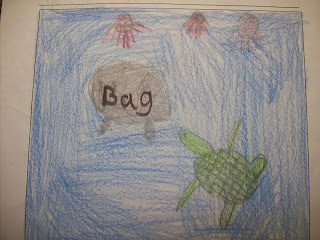
Students are often very excited to learn about things that they can personally do to help wild animals. Taking action, and knowing your actions are having a positive impact, can be very empowering.
During our grade 4 Keep It Wild! workshop, Save our Seas, students learn about the impact that human pollution has on ocean animals. They also learn simple things that they can do to make a positive change for wild animals. One such action is to prevent the release of balloons into our environment. Once balloons break and come down to earth, they can be ingested by wild animals, and their attachments can entangle wild animals.
Take a few minutes to learn more about the impact of balloons at: Alliance for Balloon Education. Then take a few more minutes to tell someone else about the negative impact the release of balloons can have.
 |
| Entangled Bird (Photo: Alliance for Balloon Education) |








